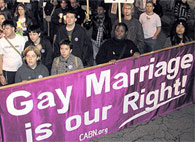California's Proposition 8 debate has taken a twist last week with a new ballot measure, approved for circulation this week, seeking to eliminate the term "marriage" from state statutes and replace it with "domestic partnerships."

The new measure would repeal the voter-approved gay marriage ban that passed last November, and define domestic partnerships as unions between all couples, regardless of sexual orientation.
The measure was thought up by two college students - both of whom are reportedly straight - who said in a summary of the measure that "'marriage' itself would become a social ceremony, recognised by only nongovernmental institutions."
The measure must collect 700,000 signatures by Aug 6 to qualify for the November 2010 ballot.
"I'm not religious and I'm not gay, but I am concerned about equal rights," Ali Shams was quoted as saying in the San Francisco Chronicle. The 22-year-old political science major at University of California San Diego is pushing the measure with his friend Kaelan Housewright, a student at CalArts in Valencia (Los Angeles County).
"A lot of people who voted for Prop. 8 did so because their religious beliefs tell them marriage is between a man and a woman," said Shams. "They aren't necessarily against same-sex couples, but they can't go against their religious beliefs. With this option, we're allowing them to bypass that dilemma."
Earlier two law professors proposed in the San Francisco Chronicle (A Equality in substance and in name, Mar 2) that the best way out of the intractable legal wars over gay marriage is to take marriage out of the hands of the government altogether.
Pepperdine University professors Douglas W. Kmiec and Shelley Ross Saxer urged readers to re-examine the role the government plays in marriage. Saxer opposed Prop 8 for civil rights reasons while Kmiec supported it for reasons of religious liberty.
Their idea got additional air time during the Mar 5 oral arguments before the California Supreme Court, which is expected to issue a ruling in three months in the case brought by gay couples and others who argue the constitutional amendment passed by voters last fall is invalid.
According to a report on Time.com, both sets of lawyers - when asked by Justice Ming Chin - agreed that the idea would resolve the question of whether some couples could marry, and others not, violates constitutional guarantees of equal protection under the law.
But as Time's Michael A. Lindenberger pointed out, Justice Chin may find that "the folks who cling hardest to the word 'marriage' are the gay couples themselves [after] having... fought so hard and so long to have [the word] apply to themselves" as the courts try to come to a compromise between upholding Prop 8 and according gay people the right to be treated equally.
Read more:
A way out of Prop. 8 (Los Angeles Times editorial): "The most adamant opponents almost certainly would be the supporters of Proposition 8, the same people who argue that same-sex couples already have all the benefits of marriage through the state's civil union laws and are just quibbling about a label. Chances are that they won't see things the same way when it comes to changing the name of their own legal relationships."
A Gay Marriage Solution: End Marriages for Everyone? By Michael A. Lindenberger (Time.com): "And as Justice Chin considers whether he can craft a compromise with his fellow justices that would both uphold Prop 8 - and therefore the right of the people to amend the state constitution - and assert the right of gay people to be treated equally, he may find that the folks who cling hardest to the word "marriage" are the gay couples themselves. After all, what was the most sweeping part of the May 2008 decision Ming and his colleagues issued granting gays the right to marry? It was the idea that the word "marriage" itself is so strong that denying it to gay couples violates the most sacred rights enshrined in the state constitution, the right for all people to be treated with dignity and fairness. Just 10 months later, gay couples - whether they are among the 18,000 who married in the state before Prop 8 stopped the ceremonies or not - are loath to lose a word for which so many fought so hard and so long to have apply to themselves."
Equality in substance and in name by Douglas W. Kmiec, Shelley Ross Saxer (San Francisco Chronicle): "The argument for Prop. 8 must be resisted for two reasons: First, because it gives the proposition a far broader discriminatory effect than its language warrants, and second, the proposition is oblivious to the differing faith practices of our citizens. Marriage is of religious origin; it should remain there. Indeed, neither the original court decision nor Prop. 8 showed adequate recognition of the religious nature of marriage, so Thursday's case can be a do-over. Some faiths accept same-sex relationships and others profoundly object. As a matter of religious freedom, both must be accommodated, but how? Separate state and church. Prop. 8 keeps the state - not the church - from using the terminology of marriage to officially acknowledge a same-sex relationship."
